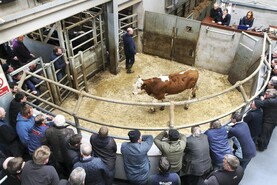This time of year is a good time to reflect on your farms performance over the past year, identify what worked well last year, but also the areas where improvements can be made. Be it calf health, fertility, lameness or milk solids produced, there are very few farms that don’t have room for improvement in some area. Identify the weakness, plan how to improve and monitor the results.
An example of a weakness we have seen in the past number of years is high empty rates (20-25% on some farms). The farm often has good fertility in the early stage of the breeding season, but once the bull is left out, the results begin to deteriorate. This can also be seen in the following spring, when there is a big lull in numbers calving after an initially hectic five to six weeks. This “lull” is less dramatic in herds that employ teams of bulls.
This is often caused by insufficient bull power on the farm. Cow numbers have increased without a corresponding increase in the number of bulls. Once the recommended number of straws have been used, the bulls sweep up the remaining cows. Ideally, each bull will serve less than three cows in any 24-hour period. If overworked, the bull’s sperm reserve will be depleted and fertile heats will be missed. Each missed heat costs €250. Interchange bulls regularly to allow time to recuperate.
All bulls should be fertility tested in spring. Many vets are specially trained to perform breeding soundness examinations. An experienced bull is considered fertile if he impregnates 90% out of 50 cows in nine weeks, while a young bull may only manage 50% of this in the same time. As most bulls will only remain with the herd for six weeks, a fertile, experienced bull per 30 open females, or 15 cows per young bull, would be the recommended requirement.
It is also vital to realise that any health issues, such as lameness/injury, illness, or parasitism, that occur in the male animal prior to, or during, the breeding season can result in the bull becoming temporarily infertile for six to eight weeks. This effectively rules the bull out for the rest of the breeding season.
This year’s resolution could be to assess bull power:
Ensure you have enough healthy fertile bulls.Buy new bulls early to allow time to acclimatise on new farm.Don’t overwork young bulls and avoid excessive weight loss.Include bulls in the herd vaccination programme.Remove any ill/lame/injured bull until recovered and fertility tested. Ensure farm has plan in place to deal with emergencies.Kevin O’Sullivan works at Glasslyn Veterinary Clinics, Glasslyn Rd., Bandon, Co. Cork. Glasslyn Veterinary Clinics is part of XLVets. For information, see www.xlvets.ie
This time of year is a good time to reflect on your farms performance over the past year, identify what worked well last year, but also the areas where improvements can be made. Be it calf health, fertility, lameness or milk solids produced, there are very few farms that don’t have room for improvement in some area. Identify the weakness, plan how to improve and monitor the results.
An example of a weakness we have seen in the past number of years is high empty rates (20-25% on some farms). The farm often has good fertility in the early stage of the breeding season, but once the bull is left out, the results begin to deteriorate. This can also be seen in the following spring, when there is a big lull in numbers calving after an initially hectic five to six weeks. This “lull” is less dramatic in herds that employ teams of bulls.
This is often caused by insufficient bull power on the farm. Cow numbers have increased without a corresponding increase in the number of bulls. Once the recommended number of straws have been used, the bulls sweep up the remaining cows. Ideally, each bull will serve less than three cows in any 24-hour period. If overworked, the bull’s sperm reserve will be depleted and fertile heats will be missed. Each missed heat costs €250. Interchange bulls regularly to allow time to recuperate.
All bulls should be fertility tested in spring. Many vets are specially trained to perform breeding soundness examinations. An experienced bull is considered fertile if he impregnates 90% out of 50 cows in nine weeks, while a young bull may only manage 50% of this in the same time. As most bulls will only remain with the herd for six weeks, a fertile, experienced bull per 30 open females, or 15 cows per young bull, would be the recommended requirement.
It is also vital to realise that any health issues, such as lameness/injury, illness, or parasitism, that occur in the male animal prior to, or during, the breeding season can result in the bull becoming temporarily infertile for six to eight weeks. This effectively rules the bull out for the rest of the breeding season.
This year’s resolution could be to assess bull power:
Ensure you have enough healthy fertile bulls.Buy new bulls early to allow time to acclimatise on new farm.Don’t overwork young bulls and avoid excessive weight loss.Include bulls in the herd vaccination programme.Remove any ill/lame/injured bull until recovered and fertility tested. Ensure farm has plan in place to deal with emergencies.Kevin O’Sullivan works at Glasslyn Veterinary Clinics, Glasslyn Rd., Bandon, Co. Cork. Glasslyn Veterinary Clinics is part of XLVets. For information, see www.xlvets.ie






 This is a subscriber-only article
This is a subscriber-only article









SHARING OPTIONS: